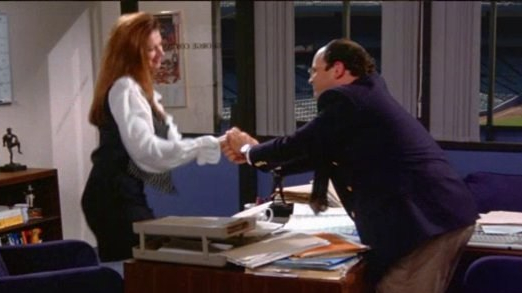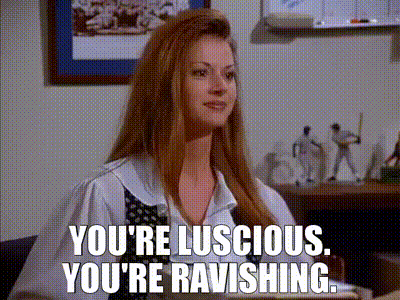In order to help him take down messages from his mother, George decides to hire a secretary. But fearing that he’ll never get any work done if he goes “the tomato route,” George decides to do a “complete 360” and rejects secretarial candidates for being too attractive. He only considers candidates based on their work efficiency and ability. Is denying someone employment because they are too beautiful against the law? Could Ms. Coggins and the other denied applicant sue George and the New York Yankees for appearance discrimination?
Discrimination based on physical appearance is not expressly prohibited by either New York or Federal Law. Instead, Federal and New York statutes protect certain classes of people from discrimination: race, age, religion, sex, or national origin and a few others. But being so physically attractive that you cause George to forget his own name is not such an explicitly protected class. The Supreme Court has also not directly addressed appearance discrimination either. So in order to bring a suit, Ms. Coggins would have to claim that she was denied employment based on one of the statutorily protected classes. For Ms. Coggins, it seems likely that she could claim discrimination based on sex or age.
As an earlier post explored in “The Butter Shave,” the first step in presenting a suit of employment discrimination under the Mcdonnell Douglas framework is for the plaintiff, Ms. Coggins in this case, to satisfy the 4 elements of the prima facie case of discrimination. They are:
- That the plaintiff is of a protected class.
- Was qualified and applied for the position.
- Despite the qualifications, was rejected.
- After being rejected the position remained open and the employer sought out prospective employees that had the same qualifications as the plaintiff.
Ms. Coggins will have no trouble showing these elements here. (1) She could at least attempt to claim she was discriminated against based upon the protected classes of sex or age, (2) she clearly had the requisite job qualifications since she types well and says she is proficient in IBM and Macintosh, (3) George rejected her, and (4) he hired someone else.
The next step in proving a discrimination case is to give the employer the opportunity to prove that the employment decision was not actually based upon discrimination. And here, George and the Yankees will have no trouble proving that neither sex nor age was considered in the hiring process. George interviews three candidates: Ms. Coggins, an unidentified woman, and Ada, whom he ultimately hires. All 3 applicants are white and female, and they seem to be of the same age. We don’t know anything about their religious practice, and it appears safe to assume that they are all American. Therefore, it is going to be extremely difficult for Ms. Coggins to prove that she was discriminated against based upon any of the protected classes, because all of the applicants were, essentially, the same.
Therefore, the only way for Ms. Coggins to win is for her to argue that even though physical appearance is not a statutorily protected class, a court should still consider discrimination based upon an applicant’s “luscious,” “ravishing” beauty to be illegal. However, allegations of beauty discrimination have been found by the courts to violate neither Federal nor State law. An Iowa court ruled that an employer could fire his secretary when his wife demanded he do so out of fear he may cheat on her. The court’s rationale was that the decision was not based on personal appearance really, rather it was based on the workplace relationship between the two parties. Courts will defer to employer managerial decisions when they are based on legitimate workplace issues, as long as they are bona fide occupational qualification and not pretenses for discriminatory action. This is why courts across the country have often upheld grooming and appearance policies in the workplace so long as they do not impose an unfair burden on one sex over the other.
Ms. Coggins could make out a claim based on sex stereotyping, which courts have found to occur when an employer discriminates against an employee (or applicant) for failing to conform to certain stereotypes about how men or women are supposed to be behave. But successful plaintiffs in sex stereotyping cases tend to demonstrate that they were discriminated against for not conforming to expected behavior regarding their own sex. In our scenario, George is merely hiring a candidate using general notions of attraction as a factor.
Even though it is unlikely Ms. Coggins could sure based on appearance discrimination, she would have had a much more clear-cut case had George hired a man for the secretary position instead of Ava. This is because George would have actually engaged in sex-discrimination, by excluding all women from the position, instead of just attractive distinguishing between attractive and unattractive women.
It should also be noted that George initially tells Jerry that he’s “going for total efficiency and ability.” Kudos to George! These are pretty much the only qualifications, perhaps along with general personality, an employer should be looking for in an applicant while hiring: can the candidate do the job?
Where George would have run into a far more serious problem was if he engaged in more explicit sex discrimination, like exclusively interviewing men or women for the position. While it is true that only women were shown to interview for the secretary position, there is no indication that men were discriminated against.
Since the type of discrimination George engaged in is not prohibited by New York or Federal law, George and the Yankees would likely win on any discrimination suit brought against them by the denied applicants.
While some jurisdictions have local ordinances that protect against all forms of appearance discrimination, employers still always have the defense of demonstrating that appearance is a bona fide occupational qualification for their particular workplace environment. Ultimately though, for Ms. Coggins to bring a successful suit, she is going to have to petition either New York State or the Federal government to craft new legislation protecting applicants from appearance discrimination.






Just wanted to say that I love this blog! I’ve just read every article and I love how simple you guys make the legal jargon. Fun and educational. Of course I appreciate the episode references too
Thank you so much! We hope you’ll check us out on Facebook and Twitter so you can get updated on future posts, and tell your friends!
So glad you like the blog!!